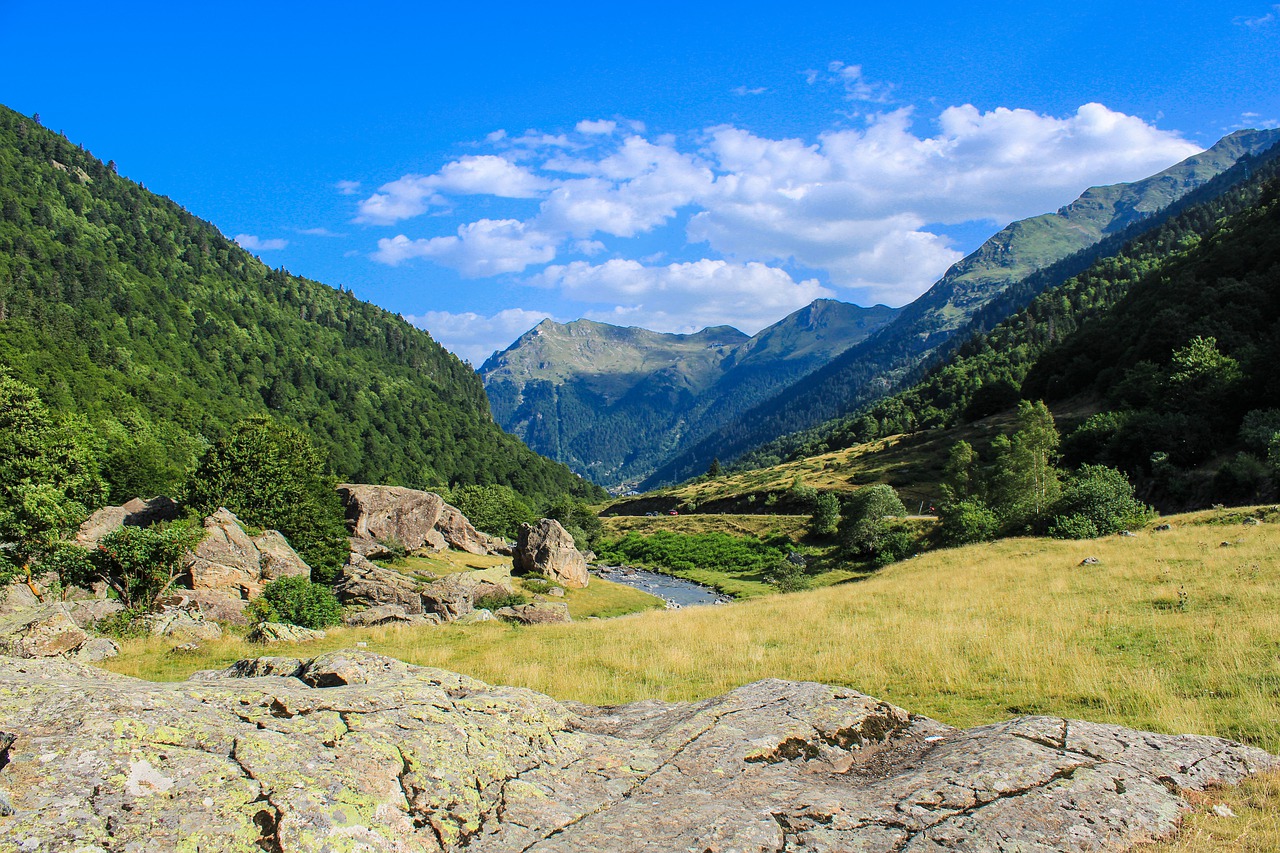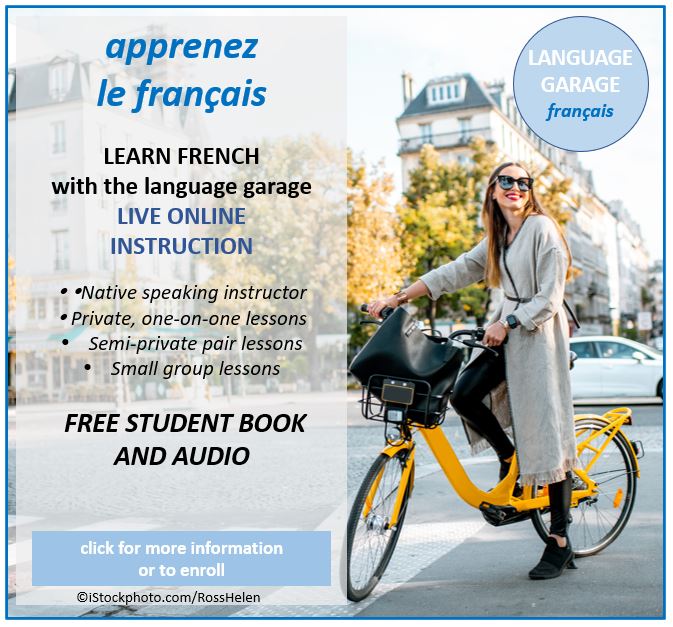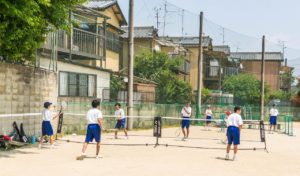Image by armennano from Pixabay
In this post we’ll learn some vocabulary and expressions that you can use to talk about the natural world.
Des fleurs, des arbres, de l’herbe et de l’air frais Flowers, Trees, Grass, and Fresh Air
Let’s start with some basics of nature that you can find around you even if most of the nature you see is in a park: un arbre (a tree), une fleur (a flower), un jardin (a garden), l’herbe (grass), une plante (a plant), un lac (a lake), une mare (a pond), un chemin (a path), un bois (woods). You’re probably not going to see much wildlife in a park, but if you’d like to know how to talk about the animals you do see, check out this post.
- Il y a beaucoup d’arbres dans le parc.
There are lots of trees in the park. - Regarde cette belle fleur.
Look at that beautiful flower.
- Asseyons-nous sur l’herbe.
Let’s sit in the grass. - Asseyons-nous sur le banc à côté du jardin.
Let’s sit on the bench next to the garden. - Il y a un chemin à travers les bois.
There’s a path through the woods. - Marchons autour de la mare.
Let’s walk around the pond. - Y a-t-il des poissons dans ce lac ?
Are there fish in this lake? - Est-ce que le lac est profond (ou peu profond) ?
Is the lake deep (or shallow)?
Arbres et plantes Trees and Plants
No matter where we are, there’s usually some kind of plant life around us, even if it’s in a pot in the corner of your office: une plante d’intérieur (houseplant), un pot de fleurs (flowerpot), une rose (rose), une épine (thorn), la terre (soil), une feuille (leaf), un gland de chêne (acorn), une tige (stem), une graine (seed), une noix (nut), arroser une plante (to water a plant), planter une graine (to plant a seed), fleurir; les fleur fleurissent (to bloom; flowers bloom), pousser; les plantes poussent (to grow; plants grow).
- J’ai besoin d’arroser mes plantes.
I need to water my plants. - Nous avons beaucoup de plantes d’intérieur.
We have a lot of houseplants. - C’est un beau/magnifique pot de fleurs.
That’s a beautiful flowerpot. - Les feuilles de cette plante brunissent/ deviennent marron.
That plant’s leaves are turning brown. - Les glands de chêne tombent de l’arbre.
Acorns are falling from the tree. - Les roses ont des épines sur leurs tiges.
Roses have thorns on their stems. - Cet arbre est-il un érable ou un chêne ?
Is that tree a maple or an oak? - Les pins sont verts en hiver.
Pine trees are green in the winter. - J’ai planté des graines de tomates dans le jardin.
I planted tomato seeds in the garden. - Les fleurs fleurissent au printemps.
The flowers bloom in the spring. - Les plantes dans ton jardin poussent vite.
The plants in your garden are growing quickly.
Des collines, des rivières, et vallées Hills, Rivers, and Valleys
Let’s add some more nature vocabulary: une colline (hill), une vallée (valley), une rivière (river), un ruisseau (stream), une cascade/ chute d’eau (waterfall); un champ (field), une prairie (meadow), une pierre (rock), un caillou (pebble), un rocher (boulder), un marais/ marécage (swamp).
- Notre maison est sur une colline.
Our house is on a hill. - Nous habitons à côté d’une rivière.
We live next to a river. - La rivière coule rapidement ici.
The river runs quickly here. - Il y a une belle cascade près d’ici.
There’s a beautiful waterfall nearby. - Il y a beaucoup de fermes dans la vallée.
There are a lot of farms in the valley. - Il y a un petit ruisseau dans les bois près de notre maison.
There is a little stream in the woods near our house. - Nous avons traversé le champ.
We walked across the field. - Il y a de belles fleurs sauvages dans la prairie.
There are beautiful wild flowers in the meadow. - Il y a beaucoup de pierres et de rochers sur la colline.
There are a lot of rocks and boulders on the hillside. - Cette route passe à travers un marais.
This road goes through a swamp.
Montagnes et forêts Mountains and Forests
If you ever get to the mountains, you may need to say: une montagne (a mountain); une chaîne de montagnes (a mountain range); le sommet de la montagne (the summit of the mountain); faire une rando(nnée) en montagne (to hike in the mountains); monter/ grimper une montagne (to climb a mountain); un pic (a peak); une falaise (a cliff); une forêt (a forest); camper dans la forêt (to camp in the forest); des pins/ sapins (m.) (pine trees); des érables (m.) (maple trees); des chênes (m.) (oak trees); des bouleaux (m.) (birch trees); des animaux sauvages (wild animals).
- Il y a deux chaînes de montagnes dans ce pays.
There are two mountain ranges in this country. - On peut voir de belles montagnes de notre fenêtre.
We can see beautiful mountains from our window. - Quelle est la hauteur de la montagne ?
How high is the summit of this mountain? - Les pics de montagnes sont couverts de neige.
The mountain peaks are covered in snow. - Quelle est la hauteur de ces falaises ?
How high are those cliffs? - J’aime camper dans la forêt.
I like to camp in the forest. - Il y a des pins, des érables, des bouleaux et des chênes dans cette forêt.
There are pine trees/maple trees/birch trees/oak trees in this forest. - Y a-t-il des animaux sauvages dans cette forêt ?
Are there wild animals in this forest?
Le monde The World
Let’s finish with some geographical terms that you can use to talk about the natural world. un continent (continent), un océan (ocean), une mer (sea), une baie (bay), une côte (coast), une île (island), une péninsule (peninsula), un désert (desert), une jungle (jungle), un glacier (glacier), un iceberg (iceberg), le pôle nord/ sud (north/ south pole), le nord/ le sud/ l’est/ l’ouest (north/ south/ east/ west).
- Combien de continents y a-t-il ?
How many continents are there? - L’océan est large et profond.
The ocean is wide and deep. - J’adore nager dans la mer.
I love swimming in the sea. - La rivière se jette dans une grande baie.
The river empties into a big bay. - On a roulé le long de la côte.
We drove along the coast. - Il faut prendre le ferry pour rejoindre l’île.
You have to take a ferry to get to the island. - Le désert est chaud et sec.
The desert is hot and dry. - Beaucoup de plantes et d’animaux différents vivent dans la jungle.
Many different plants and animals live in the jungle. - Les glaciers deviennent de plus en plus petits.
The glaciers are getting smaller and smaller. - Il y a des icebergs dans l’océan près du pôle nord/sud.
There are icebergs in the ocean near the north/south pole. - Le soleil se lève à l’est et se couche à l’ouest.
The sun rises in the east and sets in the west.
Do you want to learn French?
Check out our other posts on French language, culture, and more. And if you’re looking for convenient and affordable live French lessons with a real teacher, check out The Language Garage. Our lessons are given online in a virtual classroom, so it doesn’t matter where you live or work. We can come to you. And we have flexible options, with a free trial so that you can decide if there’s a fit. Check us out!






